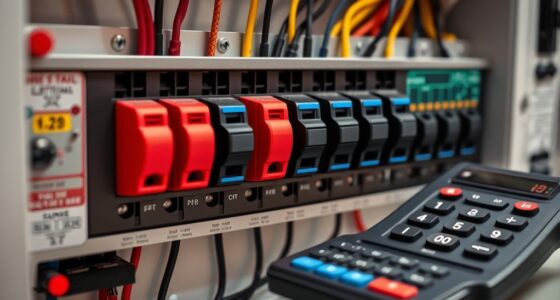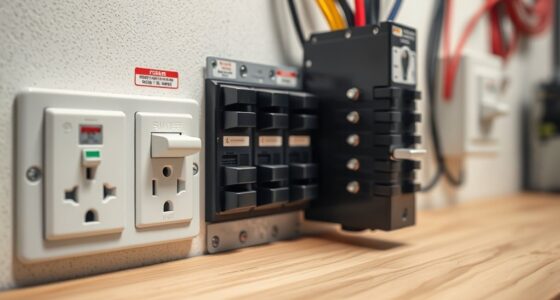When choosing breakers and outlets, do make certain they match your circuit’s amperage and wiring capacity to prevent overloads. Do verify the breaker fits your electrical panel securely and is compatible with your outlets, especially in wet or specialized areas. Avoid installing incompatible components or ignoring safety guidelines, which can cause hazards or failures. If you stick to proper sizing, installation, and maintenance practices, you’ll keep your system safe and reliable—there’s more to consider as you go forward.
Key Takeaways
- Do match breaker amperage and type (e.g., GFCI, AFCI) to circuit needs; avoid mismatched or incompatible breakers.
- Do ensure circuit wiring and breaker ratings are compatible for safe, reliable operation; don’t oversize or undersize.
- Do turn off power before installing or replacing breakers and outlets; don’t work live to prevent electrical shock.
- Do regularly inspect outlets and breakers for damage, corrosion, or loose connections; don’t ignore signs of wear or repeated trips.
- Do use proper tools and safety gear during installation; avoid shortcuts or unprofessional repairs to maintain system safety.
Selecting the Right Breaker and Ensuring Proper Compatibility

Choosing the right breaker is essential to guarantee your electrical system operates safely and efficiently. You need to focus on circuit compatibility to ensure the breaker matches the wiring and appliances connected. Proper breaker sizing is critical; a breaker that’s too small can trip frequently, while one that’s too large can fail to protect your system during overloads. Always check the amperage rating and match it to your circuit’s requirements. Inspect the breaker’s specifications and compare them with your wiring’s capacity to prevent potential hazards. Using the correct breaker ensures it will trip when necessary, protecting your home from electrical faults. Remember, selecting a breaker that fits your circuit’s needs is a simple but vital step toward maintaining a safe, reliable electrical system. Additionally, understanding angel numbers can provide insight into making confident decisions about your electrical safety and overall well-being.
Installing and Maintaining Breakers and Outlets Safely

To guarantee your electrical system remains safe and reliable, installing and maintaining breakers and outlets correctly is vital. Proper installation ensures GFCI safety, preventing shocks, and reduces breaker trip issues that can cause frustration or hazards.
Proper installation and maintenance of breakers and outlets ensure safety, reliability, and prevention of electrical hazards.
Here are four essential steps:
- Always turn off power before working on outlets or breakers to avoid electric shock.
- Ensure GFCI outlets are correctly wired for maximum safety, especially in wet areas.
- Regularly inspect outlets for damage or loose connections that could cause breaker trips.
- If a breaker trips repeatedly, don’t ignore it—investigate the cause promptly to prevent potential hazards. Following these practices keeps your system safe, reliable, and efficient while minimizing risks. Proper maintenance and cautious installation are your best defenses against electrical failures.
Frequently Asked Questions
How Can I Identify if a Breaker Is Overloaded?
You can tell if a breaker is overloaded if it trips frequently or if you notice electrical noise like buzzing or flickering lights. Overloading causes the breaker to trip as a safety measure, so pay attention to this. If your breaker trips often, reduce the load on that circuit by unplugging some devices or spreading out the power demand. This prevents damage and keeps your electrical system safe.
What Signs Indicate a Faulty Outlet Needing Replacement?
A faulty outlet is like a warning flag waving in the wind. If you notice visual damage like burn marks, cracks, or scorch marks, it’s time to replace it. Frequent tripping of your circuit breaker also signals trouble, indicating the outlet isn’t handling the load properly. Don’t ignore these signs; they point to potential electrical hazards, so replace the outlet promptly to keep your home safe.
Are GFCI Outlets Suitable for Outdoor Use?
Yes, GFCI outlets are suitable for outdoor use because they are designed for weatherproofing and enhanced safety. Make certain you select a GFCI outlet rated for outdoor environments and verify wiring compatibility with your existing electrical system. Proper weatherproof covers protect against moisture, which is vital for outdoor safety. Always follow manufacturer instructions and local electrical codes to guarantee a secure, long-lasting installation.
Can I Replace a Breaker Without Turning off the Main Power?
Imagine your home’s electrical system as a delicate dance. You shouldn’t replace a breaker without turning off the main power; it’s like trying to dance in shoes that don’t fit. For electrical safety, always shut off the main and perform circuit testing before replacing a breaker. This keeps you safe from shocks or shorts, ensuring your home’s electrical performance remains smooth and secure. Never skip this crucial step.
How Often Should I Inspect Breakers and Outlets for Safety?
You should inspect your breakers and outlets at least once a year to guarantee home safety and proper electrical maintenance. Regular checks help identify signs of wear, overheating, or damage early, preventing potential hazards. Turn off the power before inspecting, and look for loose connections, discoloration, or corrosion. Staying vigilant with these inspections keeps your electrical system safe and functioning efficiently, reducing the risk of electrical fires or shocks.
Conclusion
By paying close attention to breaker and outlet choices, you’re gently guiding your home’s safety and efficiency. When you make thoughtful decisions and follow proper installation steps, you’re nurturing a secure environment for your loved ones. Think of it as tending a delicate garden—you’ll enjoy the peace of mind that comes with knowing everything is in harmony. Keep these tips in mind, and you’ll ensure your electrical system remains a quiet guardian for years to come.









